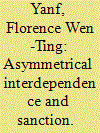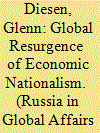| Srl | Item |
| 1 |
ID:
170627


|
|
|
|
|
| Summary/Abstract |
Since China’s economic rise, there has been an upsurge of cases demonstrating that the country has translated its increasing economic capabilities into political influence over other states. The focus of this paper is to investigate the case of China’s economic sanctions on South Korea in response to its Terminal High Altitude Area Defense (THAAD) deployment. Its goal is to deepen our understanding of how China has employed economic coercion in order to alter the policies of other states. China’s economic sanctions have included intentional ones like the Hallyu ban, a ban on tourism, non-tariff measures, the shutting down of Lotte Marts, and the fomenting of anti-Korean sentiment in its official media. There is however insufficient evidence to prove that these boycott movements and reductions in direct investment on the part of Chinese companies are government-mandated sanctions and not simply the choice of individual actors. Our findings indicate that due to its asymmetrical interdependence on China, South Korea was more vulnerable to economic sanctions and thus more likely to make political concessions.
|
|
|
|
|
|
|
|
|
|
|
|
|
|
|
|
| 2 |
ID:
161054


|
|
|
|
|
| Summary/Abstract |
Economic nationalism advocates state intervention in the market to create favorable symmetry in economic interdependence with other powers. All major economies have ascended to greatness with state interventions, and economic liberalism becomes a mere covert economic nationalism by hegemons. Once in control over the levers of the global economy it is in the interest of the hegemon to propagate economic liberalism to integrate other powers into asymmetrical interdependent partnerships. The Trump administration’s embrace of overt economic nationalism indicates the unravelling of the U.S. privileged geo-economic position. Relative decline is evident by a crumbling U.S. manufacturing base and narrowing superiority in innovations, the creation of alternative trade corridors outside U.S. control, and nascent rivals to the Bretton Wood institutions and the U.S. dollar. As geo-economic power shifts from the West to the East and invokes a global resurgence of economic nationalism, opportunities arise for Russia to develop more symmetry in the interdependent global economy.
|
|
|
|
|
|
|
|
|
|
|
|
|
|
|
|